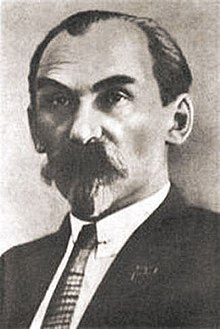Mykola Skrypnyk
| Mykola Skrypnyk Микола Олексійович Скрипник |
|
|---|---|
 |
|
| Chairman of the People's Secretariat | |
|
In office 4 March 1918 – 18 April 1918 |
|
| President |
Yukhym Medvedev Volodymyr Zatonsky (chairman of Central Executive Committee) |
| Preceded by | Yevgenia Bosch (acting) |
| Succeeded by | reorganized as The Uprising Nine |
| People's Secretary of Labor Affairs | |
|
In office 4 March 1918 – 18 April 1918 |
|
| Prime Minister | Mykola Skrypnyk |
| Preceded by | position created |
| Succeeded by | position disbanded |
| People's Commissar of Internal Affairs | |
|
In office July 1921 – April 1922 |
|
| Prime Minister | Christian Rakovsky |
| People's Commissar of Justice | |
|
In office April 1922 – 1927 |
|
| Prime Minister | Christian Rakovsky |
| Preceded by | Mikhail Vyetoshkin |
| Succeeded by | Vasyl Poraiko |
| Prosecutor General of Ukraine | |
|
In office 1922–1927 |
|
| President | Grigory Petrovsky |
| Preceded by | position created |
| Succeeded by | Vasyl Poraiko |
| People's Commissar of Education | |
|
In office March 1927 – February 1933 |
|
| Prime Minister | Vlas Chubar |
| Head of | |
|
In office February 1933 – 7 July 1933 |
|
| Prime Minister | Vlas Chubar |
| Preceded by | Yakym Dudnyk |
| Succeeded by | Yuriy Kotsiubynsky |
| Personal details | |
| Born |
25 January 1872 Yasynuvata, Yekaterinoslav Governorate, Russian Empire |
| Died | 7 July 1933 (aged 61) Kharkiv, Soviet Union |
| Citizenship | Russia, Soviet |
| Nationality | Ukrainian |
| Political party | RSDLP(b) |
| Alma mater | Saint Petersburg State Institute of Technology |
Mykola Oleksiyovych Skrypnyk (Ukrainian: Микола Олексійович Скрипник, 25 January [O.S. 13 January], 1872 – 7 July 1933) was a Ukrainian Bolshevik leader who was a proponent of the Ukrainian Republic's independence, and led the cultural Ukrainization effort in Soviet Ukraine. When the policy was reversed and he was removed from his position, he committed suicide rather than be forced to recant his policies in a show trial. He also was the Head of the Ukrainian People's Commissariat, the post of the today's Prime-Minister.
Skrypnyk was born in the village Yasynuvata of Bakhmut uyezd, Yekaterinoslav Governorate, Russian Empire in family of a railway serviceman. At first he studied at the Barvinkove elementary school, then realschules of the cities Izium and Kursk. While studying at Saint Petersburg State Institute of Technology, he was arrested on political charges in 1901, prompting him to become a full-time revolutionary. Originally member of the Saint Petersburg Hromada society, Skrypnyk left it and joined the Russian Social Democratic Labour Party. Skrypnyk was eventually excluded from the Institute. He was arrested fifteen times, exiled seven times, and at one point he was sentenced to death. In 1913 Skrypnyk was an editor of the Bolshevik's legal magazine Issues of Insurance and in 1914 was a member of the editorial collegiate of the Pravda newspaper.
After the February Revolution Skrypnyk arrived from one of his exiles to Morshansk (Tambov Governorate) to Petrograd where he was elected as a secretary of the Central Council of Factories Committees. During the October Revolution Skrypnyk was a member of the MilRevKom of the Petrograd Soviet of Workers' and Soldiers' Deputies.
...
Wikipedia
